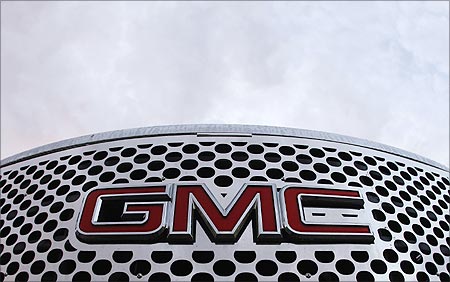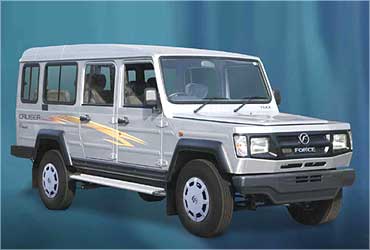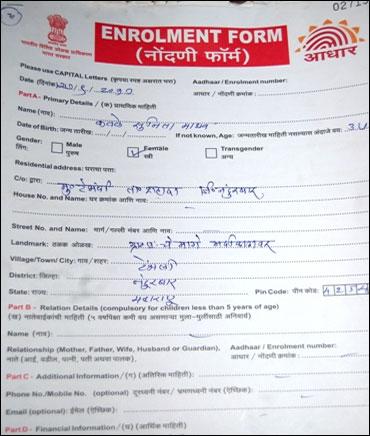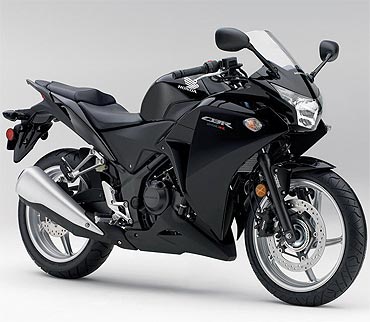
American car maker General Motors on Thursday said it has shelved plans to launch small car in India that was planned to take on Tata Motors' 'Nano', citing viability issues.
"It (small car) was under discussion when the Rs 1 lakh car (Nano) came in. We have reached a decision point that it is not right for us," General Motors India (GMI) president and MD Karl Slym said.
The small car was looked to be positioned below the company's existing entry level compact car 'Spark', he added.
"We did have a plan (to launch a smaller car than Spark), but no longer now. We have shelved the plans to get into that segment," Slym said.
There is no decision now to go below the segment where 'Spark' is present and GMI's all future models in India will be positioned above this car, he added.
Slym said when the 'Nano' came, there was much talk about the Rs 1-lakh price but it is no longer the case as the price has already gone up.
The flagship small car 'Spark' comes with a 1,000 cc engine in both petrol and LPG options. As per GMI's website, the car is priced between Rs 3.01 lakh (Rs 301,000) and Rs 4.31 lakh (Rs 431,000) -- ex-showroom, Delhi.
When asked if the company would introduce a smaller engine in the 'Spark', Slym did not commit himself but said: "We have a powertrain facility that can produce different types of engines."
The company has now geared up to launch the diesel variant of its another small car 'Beat' in next month.
"This is going to be one of the most fuel efficient cars. As per ARAI standards, the car will give a mileage of 24 km for every litre," Slym said.
The carmaker, which has two production plants at Halol in Gujarat and Talegaon in Maharashtra, is investing USD$500 million (over Rs 2,200 crore) by the end of next year to increase its capacity and consolidating R&D activities.
It will also hire about 1,000 people by 2012 in line with its plans to expand the current production capacity by over 80 per cent to 4.1 lakh (410,000) units per annum at its two facilities.
The company is expanding the capacity in order to roll out its Chinese partner SAIC's commercial vehicles in India. The first of a series of five vehicles will be launched during the Auto Expo in the National Capital in January 2012.
. . .

Having cemented a strong position in the commercial vehicle segment, Pune-based Force Motors on Thursday said it plans to foray into the passenger vehicle segment with the launch of sports utility vehicles under the Force One brand by end-July.
The company aims to sell 4,000 SUVs in the first year of launch and 8,000-9,000 units in the next two years.
"We are a good brand in the commercial vehicles segment and now we will foray into the passenger vehicles segment as well. With the market growing in this segment, we want to tap the opportunity," Force Motors' managing director Prasan Firodia said.
The auto major has already invested Rs 150-crore (Rs 1.50 billion) in the foray to develop the SUV and set up a manufacturing unit at Pithampur in Madhya Pradesh for the same.
The facility has an installed capacity of 12,000 SUVs, which can be ramped-up further.
"The initial capacity will be 12,000 SUVs per year but we can ramp it up to 18,000-20,000 units annually to meet the market demand," he said.
The company has already invested Rs 150-crore over the last 12-18 months to make SUVs in Pithampur, he said.
The company's Force One will have a 2.2-litre diesel engine and its price range is expected to be between Rs 10-12 lakh (Rs 1.0-1.2 million).
. . .

Applicants for new domestic LPG cooking gas connections can now produce the letters of allotment of Aadhaar numbers issued by Unique Identification Authority of India (UIDAI) as proof of identity and proof of address.
State-owned fuel retailers have advised their "LPG distributors to include the letter of issue of Aadhaar numbers with photograph and address issued by UIDAI as proof of identify and address for release of new LPG connections," Bharat Petroleum and Hindustan Petroleum said in identical press statements.
"Henceforth, the Aadhaar (Letter issued by UIDAI) will be included in the list of documents sufficient for issue of new domestic LPG connections," they added.
. . .

RuPay, dubbed as India's answer to MasterCard and Visa, made its debut on Monday.
Bank of India will give the first batch of automated teller machines (ATM)-cum-debit cards to Unique Identification (UID) number holders in Pagdha village of Maharashtra's Thane district.
The card, which will be given to 'no frills' account holders, can be used to withdraw cash from ATMs as well as from micro-ATMs, the hand-held devices with the bank's business correspondents.
However, for swapping the card in point-of-sale terminals at merchant establishments, customers will have to wait till the year-end.
RuPay card will have two identification features. The cardholder will have to provide the UID number for biometric identification for using micro-ATMs, while the PIN will be required for transactions via ATMs.
"Since these cards are Aadhar-based, we will issue these cards to around 90-95 people in the village who have already been allotted the UID numbers," said A P Ghugal, general manager, Bank of India.
The bank plans to roll out these cards through each of its five sponsored regional rural banks by next month. Corporation Bank and Union Bank of India are next in line to issue the ATM-cum-debit RuPay cards.
To start with, banks are targeting semi-urban areas. "To make these cards functional, one needs data connectivity which is not available in rural areas, so banks are starting out with semi-urban areas for now," said A P Hota, managing director and chief executive officer, National Payments Corporation of India (NPCI).
Backed by NPCI, RuPay card is a payment gateway and an alternative to the global real-time payment processing firms like Visa and MasterCard.
Since these cards are being issued to 'no frills' account holders for now, the limits for withdrawal and transactions will be in line with terms and conditions laid down by the banks on their respective 'no frills' accounts. -- Business Standard
. . .

The Central Information Commission has directed the Reserve Bank of India to disclose an advisory note it issued to ICICI Bank for alleged violation of any RBI guidelines or for contravention of the provisions of money laundering and foreign exchange acts.
The case relates to an RTI application filed by S S Vohra, who had sought to know details of such advisory notes issued by the apex bank to Patna and Hong Kong branches of ICICI Bank.
ICICI Bank has objected the disclosure of the information citing three exemption clauses of the RTI Act section 8(1) (a), (d) and (e).
These section exempt disclosure of information which can -- prejudicially affect the sovereignty and integrity of India, the security, strategic, scientific or economic interests of the state, relation with foreign state or lead to incitement of an offence, is related to trade secrets and commercial confidence and is held in fiduciary capacity.
During the hearing, Vohra said the Finance Minister had made a written statement in Parliament that Patna branch of ICICI Bank Limited had opened some fictitious accounts for alleged fraudsters for which an advisory note was issued to it in December 2007.
Chief Information Commissioner Satyananda Mishra said there was "no merit in the contention that the advisory note issued by the RBI to the Bank in the present case will, by any stretch of imagination, fall under exemption clauses" cited by the bank.
Rejecting the claims of ICICI Bank that such information may be personal in nature to customers and is held in fiduciary capacity by it, Mishra said opening of fraudulent accounts in a commercial bank is a grave concern and a major setback to financial system of the country.
. . .

Japanese two-wheeler manufacturer Honda Motorcycle and Scooters on Thursday said they are targeting to sell 30,000 units of its latest 250 cc global sports bike CBR-250R in India in the first year.
"We plan to sell 30,000 units of CBR 250R across India in the first year," Honda Motorcycle and Scooters India vice president (sales, marketing and corporate affairs) N K Rattan told reporters after unveiling the motorcycle.
Stating that the motorcycle was exclusively manufactured in India and Thailand, he claimed it is the first bike in 250 cc category to have a combine anti-lock braking system (ABS).
The motorcycle would come in two variants, ABS and non-ABS, priced at Rs 1.45 lakh (Rs 145,000) and Rs 1.70 lakh (Rs 170,000) --ex-showroom, Chennai -- respectively.
The CBR-250R would be available at the company's 430 dealerships across the country.
The bike would be available in six colours and has a sporty full-cowl body, Y-shaped headlights, aerodynamic layered styling, blue LCD instrument panel and a five spoke aluminium cast wheels.
Honda CBR-250R was unveiled at the four-day Auto World Expo organised by Benchmark Exhibitions India at the Chennai Trade Centre.
Besides CBR-250R, Honda currently retails 110cc CB Twister, 125cc CB Shine, 125cc CBF Stunner, 150cc CB Unicorn, 150cc CB Dazzler, 110cc Activa, 102cc Dio and 110cc Aviator.